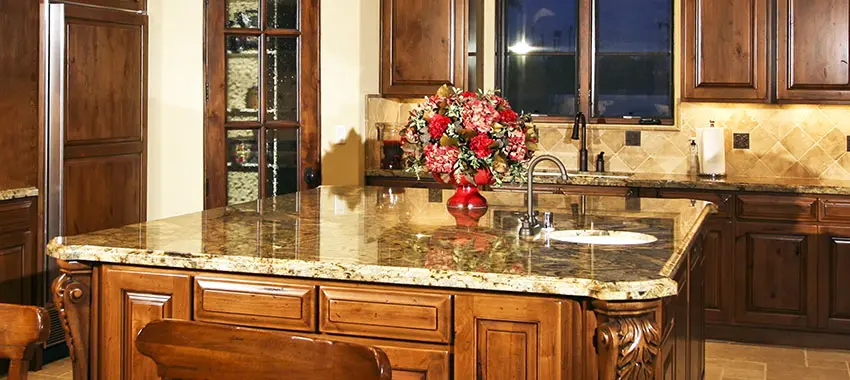
What Can You Not Do With Quartz Countertops?
- Posted on
- FlintstoneCountertops
Quartz is one of the toughest materials you can install on your countertops but this doesn’t mean you can throw just anything at it—there are some things that you can do that can damage it.
What can you not do with quartz countertops? Well, there are plenty of things you can’t do with the common ones being:
Letting spills sit on the countertops
If you have been shopping for quartz, you might have noticed that the countertops are marketed as highly stain-resistant. While this is true, the countertops aren’t stain-proof. This means that if you let the spills sit on the countertops for a long time, they are bound to get to the inner layers and stain the surfaces.
To prevent the stains from developing, make it a habit to wipe and clean the spills as soon as they happen.
You can remove some of the stains from the countertops but this isn’t a great way to go about it. Since prevention is always better than cure, you have an easier time preventing the stains from coming about in the first place by wiping the liquids and other spills as soon as you notice them.
Placing hot items directly on the countertops
The same way the countertops are stain-resistant, they are heat resistant but they aren’t heatproof. This means that if you place hot items directly on the countertops, you are bound to damage the surfaces and you don’t want this, do you?
One of the ways heat damages quartz is by creating thermal expansion due to rapid temperature changes.
The extreme temperatures also damage the resin on the countertop surfaces which causes the countertops to discolor and when the countertops discolor it’s hard to fix them. If you don’t have money to replace them, you are stuck with ugly countertops.
Cleaning the countertops using any cleaner
Since the countertops are tough you can clean them using any cleaner, right? Wrong! Like any other countertop material, using the wrong cleaning agents you damage the countertops with the most common one being stains.
As a rule of thumb, stay clear of acidic and alkaline cleaners, as they will break down the bonds between resin and quartz, which leads to permanent damage to the countertop surface.
Over time, the harsh acidic cleaners such as lime, lemon, and vinegar weaken the sealant on the countertops surface, making the countertops prone to staining.
To effectively clean the countertops without causing any damage to them, use dish soaps, hand soaps, or antibacterial soaps mixed with water.
In the same way, you should avoid abrasive cleaners, you should avoid abrasive cleaning pads. This is because the pads will cause small scratches on the surfaces that give your countertops a cheap look.
For the best results and avoid damaging the countertops, use a microfiber cloth. The cloth is soft, absorbent, and doesn’t leave any watermarks.
Cutting foods directly on the countertops
The same way you have the impression that the countertops are tough and you can place anything on them is the same way you think that you can use the countertops as a chopping board.
The countertops are tough and they can resist some of the impact but when you repeatedly expose the surfaces to the same abuse, you are bound to damage them. This means that when you repeatedly cut items on the surfaces, you will eventually damage them.
To avoid this, you should never cut directly on the countertops. Instead, always have a chopping board in the house to use for chopping tomatoes, meat, and any other thing.
Scraping the surfaces using metallic objects
Even with the best care, you are bound to have food, gum, and other materials sticking on your surfaces. To restore your countertops you have to scrape this gunk.
Some homeowners have the impression that the metallic objects will do a better job, but this isn’t the case as they are known to scratch the surfaces and leave permanent scratches on the countertops.
To get rid of the gunk and leave your countertops looking spectacular, use a plastic knife or scraper.
Sealing the countertops
The last thing you should never do is to seal the countertops. Unlike marble and granite countertops Rockville that are natural and have large pores, quartz counters are manufactured with tightly binding polymers and resins that bind the stone together and don’t require any sealing.

